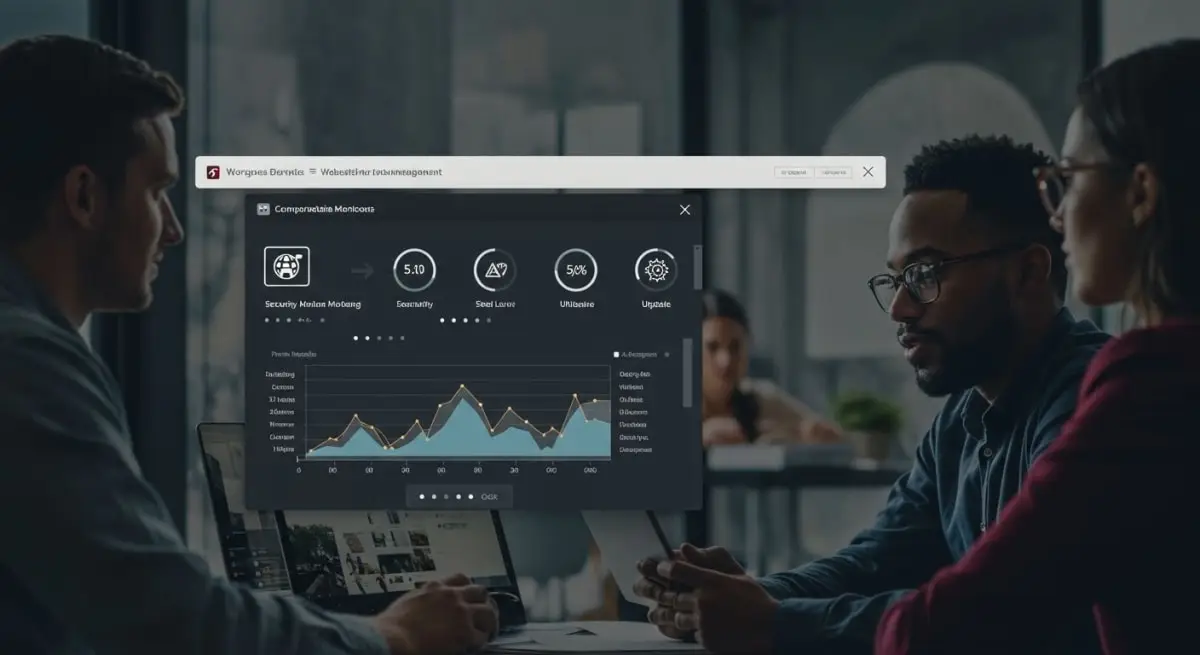Website Maintenance Services for WordPress — Just 45/Month
Our WordPress website maintenance services keep your site updated, secure, and running smoothly.
We handle daily updates, backups, and monitoring—so you don’t have to.
Everything Included In Your Website Maintenance Plan
Our WordPress maintenance plan covers the essentials that keep your website healthy and secure. We handle the daily tasks you don’t have time for—so your site stays updated, backed up, and running at its best.
Plugin & Theme Updates
We update your WordPress plugins, themes, and core files to keep your site secure and fully functional.
Security Monitoring
We monitor your site daily for potential threats and vulnerabilities—so you can rest easy.
Automatic Backups
Your website is backed up regularly, so you never lose important data.
Monthly Maintenance Report
Get a simple report each month showing what we updated, backed up, and monitored.
Uptime Monitoring
We monitor your site’s uptime 24/7 and alert our team if anything goes offline.
Easy Support Access
Need help or have a question? Just fill out our quick form—support is included.

Why Website Maintenance Matters
Without Ongoing Maintenance, Your Website Could Be At Risk
Outdated plugins and ignored updates can lead to broken pages, security vulnerabilities, and lost traffic. Even simple issues—like slow loading speeds or expired SSL certificates—can drive visitors away.
With Bochi Web’s website maintenance services, we handle everything behind the scenes—keeping your WordPress site healthy, secure, and performing smoothly.
We Keep Things Simple—So You Don’t Have to Worry
A 3-Step Website Maintenance Process That Just Works
Our WordPress website maintenance services are built for ease. We handle the hard stuff so your site stays secure, fast, and running smoothly—without interrupting your day.
Step 1:
Quick Onboarding
We’ll get you set up fast—just choose your plan and send us access. Most clients are fully onboarded in 1–2 business days.
Step 2:
Ongoing Maintenance
We quietly handle all updates, backups, and performance checks—so your website runs at its best.
Step 3:
Reliable Support
Need a hand? We’re just a message away. Send update requests or questions anytime.


Peace of Mind, in Their Words
What It Feels Like to Finally Stop Worrying About Your Website
They just handle it. I get an email each month with a summary and peace of mind in between."

One Simple Plan. Everything Your Website Needs.
No complicated tiers or surprise fees—just reliable support and daily protection in one simple monthly plan.
- Plugin & Theme Updates
- Daily Security Monitoring
- Monthly Backups
- Monthly Maintenance Report
- Fast, Reliable Support
No contracts. Cancel anytime

A Better Approach to Website Maintenance Services for Small Businesses
Most website services only handle part of the job—like hosting or occasional updates. But true website maintenance means keeping everything running smoothly, every single day.
At Bochi Web, we provide real WordPress website maintenance—daily updates, security checks, backups, and support—all included in one dependable monthly plan. No ticket systems. No hourly billing. Just fast help when you need it, and protection that never sleeps.
Whether you’re a coach, local business, or nonprofit, our plan keeps your site secure, updated, and stress-free—so you can focus on your work.
Features
Bochi Web
Other Providers
WordPress Core Updates
Included & handled for you
Must do manually
Plugin & Theme Updates
Included (monitored & applied)
Often ignored or left to you
Daily Security Monitoring
Included with alert protocols
Add-on or not included
Automatic Backups
Enabled & monitored
Not configured or extra
On-Site SEO Plugin Setup
Installed and configured
Not included
Monthly Maintenance Report
Sent via email
Not provided or unclear
Uptime Monitoring
24/7 monitoring included
Rarely included
Simple Monthly Pricing
$45/month flat
Hidden fees or hourly billing
No Contracts
Cancel anytime
Annual lock-ins or minimum terms
Why Choose Us?

Still Have Questions?
Our Website Maintenance Service was built for simplicity, but we know switching providers or starting something new raises important questions. This quick FAQ answers the most common concerns our small business clients have before getting started.
Can’t find your answer? Just reach out — we’re here to help.
What’s included with my Website Maintenance plan?
How do I send in updates or requests?
Are there any limits on the number of changes I can request?
This plan does not include ongoing content or design changes. For edits and flexible support, our Full Management Plan is a better fit.
Do you offer hosting, or do I need my own?
Can I cancel or change my plan later?
How fast are changes made?


Only $45 / Month! Unlimited Updates!
WordPress / html & css / jquery / php
One simple monthly pricing plan to keep your website updated without the headaches.
Website Maintenance Services for WordPress Sites That Need Reliable Upkeep
Keep your website fast, secure, and running smoothly with plugin updates, backups, and expert monitoring—all done for you.
One Simple Plan. Everything Your Website Needs.
No complicated tiers or surprise fees—just reliable support and daily protection in one simple monthly plan.
- Plugin & Theme Updates
- Daily Security Monitoring
- Monthly Backups
- Monthly Maintenance Report
- Fast, Reliable Support
No contracts. Cancel anytime
Website Maintenance Resources
Get updated with the latest news about our company’s achievements and activities

January Resolutions: Boost Visibility with Proven Strategies
What Is WordPress Management and Why It Matters in 2026 WordPress management is the systematic approach to maintaining, securing, optimizing, and updating WordPress websites to

5 Website Content Updates Your Service Business Needs Before Tax Season
Why Website Content Updates Matter Before Tax Season Website content updates are systematic revisions to existing web pages that improve accuracy, relevance, and conversion potential




